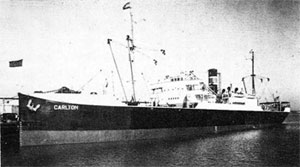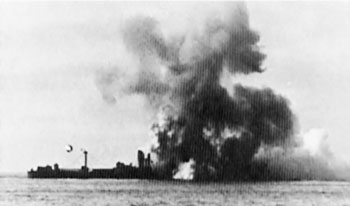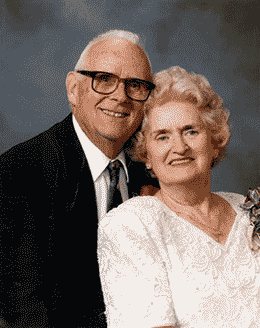
Established April 14, 1942
 |
American Ex-Prisoners of War
A not-for-profit, Congressionally-chartered veterans’ service organization advocating for former prisoners of war and their families.
Established April 14, 1942 |


SS Carlton I(courtesy Peabody Essex Museum, Salem, Massachusetts.)
|

SS Carlton aflame after being torpedoed in Arctic Ocean (Copywrite unknown)
|

Bill and "Mae", 50th wedding anniversary
|
| Last Name | First Name, Middle Init. | Nickname |
| Spouse | City | State, Zip |
| Conflict | Branch of Service | Unit: |
| Military Job | Date Captured | Where Captured |
| Age at Capture | Time Interned | Camps |
| Date Liberated | Medals Received | |
| After the War ... | ||
Before his college studies, Bill enlisted in the Navy Armed Guard and served during World War II, as a signalman. He was assigned to the USS Carleton when it was sunk by a torpedo from a German U Boat on the morning of July 5, 1942.
The Carlton was part of a WWII Arctic Convoy, which lost 24 of its 35 merchant ships during a series of heavy German attacks by bombers and submarines. Bill was among the first American prisoners to be captured by the Germans and became a prisoner of war for the next 33 and ½ months.
He was detained initially at Stalag 322, a camp for dissident Norwegian schoolteachers. From there he was taken by ship to Norway, by another to Denmark, and then by train to Germany. Because there were no American camps at the time, he was interned at Milag-Marlag Nord, in Tarmstedt, near Bremen, a camp for British Navy prisoners.
Non-commissioned officers like Bill were not required to work, but he had plans to escape and so exchanged identities with a British seaman who was being forced to work. Posing as Henry Rose of England, he was taken by train to Charlottenhof, Obersilesia and assigned to a small workgroup of prisoners repairing an irrigation canal.
After five days, he and another prisoner literally walked off the job. But he was soon recaptured and remanded this time to Stalag 8B in Lamsdorf. A short time later, he was called to headquarters, presented with his original dog-tag and sentenced to five days solitary confinement on bread and water for escaping and trying to confuse authorities
He and an American Army sergeant were the only Americans in Stalag 8B and were housed in a compound of prisoners from India, Australia, New Zealand, North Ireland, Greece and Canada. The Canadians had been captured in the failed landing at Dieppe, France and because of circumstances surrounding their capture, were forced to wear handcuffs day and night.
While in 8B, Bill began attending church services and first felt himself called into the Christian ministry. In February 1944, he was transferred to Stalag 2B in Hammerstein, Pommerania, an all-American camp, where he became the acting chaplain. In this capacity, he travelled out of the camp many weekends to hold services at the various arbeits kommandos.
In early 1945 the Russian Army broke through on the Eastern Front, and as the Russians approached Stalag 2B, the Germans abandoned the camp. The prisoners, in groups of three hundred or more, were moved west on foot. After sixty days, they crossed the Elbe River at Domitz. On April 14, Bill's group was strafed by American planes, and in the confusion he took the opportunity to escape again. As luck would have it, he came upon an American outpost. This time, he was free at last.
Bill travelled to Hildesheim by plane, and then to LeHavre and Camp Lucky Strike for repatriation, where he rejoined some shipmates he had not seen since his first escape attempt. By plane together, they were transported to England and by ship to Boston and home.
Rev. Williams was ordained as an American Baptist minister in 1956. He served in American Baptist churches in Kingston, Plymouth, Barnstable, Hyannis, Haverhill, Lanesboro, Manomet and Dorchester; in Springfield, Mo., where he served as chaplain of the U.S. Bureau of Prisons from 1959 to 1963; and in Kennewick and Waterville, Wash.
He retired in 1985, but continued pastoring area churches in Massachusetts as an interim minister. He was a member of Ex-POWs, Boy Scouts of America and Order of the Eastern Star, and was a 50-year member of the Masonic Order, Centerville chapter.
In his spare time Rev. Bill enjoyed woodworking, carving crafts such as wooden earrings, biking, and sailing.
He married Ethel Mae Tompkins in 1946, and over the course of his ministry they lived in Massachusetts, Missouri, and Washington state. Together they raised three daughters and a son and over time were graced with 10 grandchildren and nine great-grandchildren.